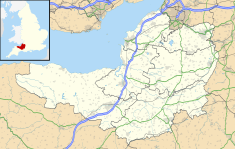Grabbist Hillfort
| Grabbist Hillfort | |
|---|---|
Grabbist hillfort shown within Somerset | |
| Location | Somerset, England |
| Coordinates | 51°10′59″N 3°27′23″W / 51.18318°N 3.456454°W |
| Built | During the Iron Age |
| Architectural style(s) | British pre-Roman Architecture |
| Official name | Hillfort on Grabbist Hill, 275m south west of St Leonard's Well |
| Designated | 11 August 2003 |
| Reference no. | 1021060 |
Grabbist Hillfort is an Iron Age oval hillfort or defended enclosure, west of Dunster in Somerset, England.
The site is 885.8 feet (270.0 m) long and 219.8 feet (67.0 m) wide, and is surrounded by a counterscarp, which measures 4.2 to 6.2 feet (1.3 to 1.9 m) in height. It is also surrounded by a ditch, which ranges up to 32.8 feet (10.0 m) wide and 7.2 feet (2.2 m) deep.[1] The bank has a peak height of 9.8 feet (3 m), and, on the northern and western sides, there is a second bank, which leads to the northeastern corner being the most strongly defended.[2] Ploughing over the years has damaged or erased some of the original features including a possible inner rampart.[3][4] If it was a hillfort it is believed to be unfinished.[5]
An area just below the site is known as the "Giant's Chair" which is a depression formed by land slippage.[3]
The site is designated as a scheduled monument.[6]
References
[edit]- ^ "Monument No. 36851". National Monuments Record. English Heritage. Archived from the original on 2 October 2012. Retrieved 23 March 2011.
- ^ "Grabbist Hillfort". Exmoor Historic Environment Record. English Heritage. Retrieved 23 March 2011.
- ^ a b "MSO9408 - Grabbist Hillfort". Exmoor Historic Environment Record. Exmoor National Park. Retrieved 3 October 2016.
- ^ Rothwell, Henry. "Grabbist Hillfort, Grabbist Hill, Dunster, Somerset". Digital Digging. Retrieved 3 October 2016.
- ^ "Hillfort on Grabbist Hill, 275m south west of St Leonard's Well". National heritage List for England. Historic England. Retrieved 3 October 2016.
- ^ "Hillfort on Grabbist Hill, 275m south west of St Leonard's Well, Dunster - 1021060 | Historic England". historicengland.org.uk. Retrieved 8 June 2022.

